We are pleased to announce the 2018 Association for Mormon Letters Awards finalists in Novel, Short Fiction Collection, and Short Fiction. The final awards will be announced and presented on March 30 at the AML Conference, held in Berkeley, California. We will be announcing the other category finalists over the coming week, including Comics, Creative Non-Fiction, Criticism, Drama, Film, Middle Grade Novel, Picture Book, Poetry, Religious Non-Fiction, and Young Adult Novel, and the two lifetime awards. The finalists and winners are chosen by juries of authors, academics, and critics. The announcements include book blurbs and author biographies, adapted from the author and publisher websites.
Novel
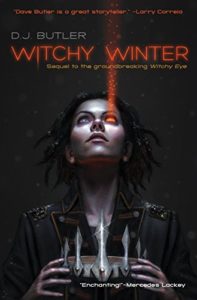 D. J. Butler. Witchy Winter. Baen.
D. J. Butler. Witchy Winter. Baen.
Publishers Weekly review: “Butler follows Witchy Eye with a satisfying second tale of a magic-filled early America. The first volume introduced 15-year-old Sarah Calhoun, who hails from the Appalachian backwoods. She discovered that she had a claim to the Serpent Throne of Cahokia, which controls the Midwest—and also learned she had two siblings, whom she hopes to meet. Now Sarah and her companions have reached her true homeland, and her family members, who are also vying for the throne, may be the least of her worries. The legendary Heron King, ruler of beastkind, has dispatched messengers warning that Peter Plowshare—his peacetime aspect, or persona—is dead, and his wartime aspect, Simon Sword, will unleash death and madness on any who resist him. Deep and old magic influences both places and characters, and the story is tightly focused on the determined Sarah, who needs the magic but only vaguely grasps its multitude of dangers. Butler spins many scattered threads that often seem disparate, yet slowly and cunningly converge on Sarah and the approaching battles. Fans of epic and alternate historical fantasy will savor this tale of witchery and intrigue.”
D.J. (Dave) Butler is a novelist living in the Rocky Mountain west. His training is in law, and he worked as a securities lawyer at a major international firm before taking up writing fiction in 2010. He is a lover of language and languages, a guitarist and self-recorder, and a serious reader. He is married to a powerful and clever novelist and together they have three devious children. He writes speculative fiction for all audiences, including middle grade, young adult and adult readers. His works include The Kidnap Plot middle grade series (a finalist for the AML Middle Grade novel award), City of the Saints, Rock Band Fights Evil, The Buza System, and Witchy Eye. He is also Acquisitions Editor at WordFire.
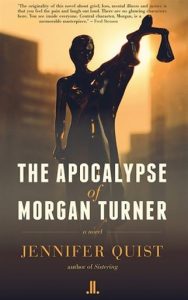 Jennifer Quist, The Apocalypse of Morgan Turner. Linda Leith.
Jennifer Quist, The Apocalypse of Morgan Turner. Linda Leith.
Morgan Turner’s grief over her sister’s brutal murder has become a rut, an everyday horror she is caught in along with her estranged parents and chilly older brother. In search of a way out, she delves the depths of a factory abattoir, classic horror cinema, and the Canadian criminal justice system, as it tries her sister’s killer and former lover, who is arguing that he is “Not Criminally Responsible” for his actions because of a mental disease. Whatever the verdict, Morgan–with the help of her Chinese immigrant coworkers, a do-gooder, and a lovelorn schizophrenia patient–uncovers her own way to move on.
Jennifer Quist is a novelist, writer, critic, and student working from the Edmonton, Alberta area. Her three novels are Love Letters of the Angels of Death (2013), Sistering (2015), and The Apocalypse of Morgan Turner (2018). Her writing has been recognized with a 2014 Alberta Lieutenant Governor’s Emerging Artist Award, a place on the 2015 Dublin International IMPAC Literary Award long-list, and the 2015 AML Novel Award. After careers in social research, journalism, and stay-at-home-mothering, she is currently a graduate student in Mandarin Chinese and Modern Languages and Cultural Studies at the University of Alberta. Her non-fiction and critical work has appeared in New Left Review, The Puritan, The Awl, CBC Radio, The Globe and Mail.
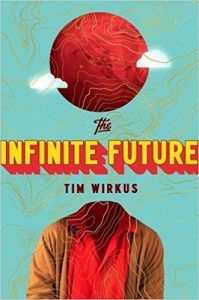 Tim Wirkus, The Infinite Future. Penguin Press.
Tim Wirkus, The Infinite Future. Penguin Press.
A mindbending novel that melds two page-turning tales in one. In the first, we meet three broken people, joined by an obsession with a forgotten Brazilian science-fiction author named Salgado-MacKenzie. There’s Danny, a writer who’s been scammed by a shady literary award committee; Sergio, journalist turned sub-librarian in São Paulo; and Harriet, an excommunicated Mormon historian in Salt Lake City, who years ago corresponded with the reclusive Brazilian writer. The motley trio sets off to discover his identity, and whether his fabled masterpiece–never published–actually exists. Did his inquiries into the true nature of the universe yield something so enormous that his mind was blown for good? In the second half, Wirkus gives us the lost masterpiece itself–the actual text of The Infinite Future, Salgado-MacKenzie’s wonderfully weird magnum opus. The two stories merge in surprising and profound ways. Part science-fiction, part academic satire, and part book-lover’s quest, this wholly original novel captures the heady way that stories inform and mirror our lives.
Tim Wirkus is the author of one previous novel, City of Brick and Shadow (2014), which was a finalist for the Shamus Award and the winner of the AML Novel Award. His short fiction has appeared in The Best American Non-Required Reading, Subtropics, Cream City Review, Weird Fiction Review, Gargoyle, and elsewhere. His novella, Sandy Downs, won the 2013 Quarterly West novella contest. He’s currently a doctoral candidate in the University of Southern California’s Creative Writing and Literature Program.
Short Fiction Collection
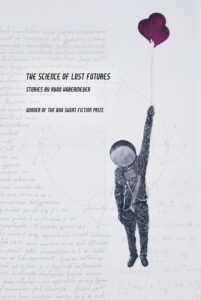 Ryan Habermeyer, The Science of Lost Futures. BOA Editions, Ltd.
Ryan Habermeyer, The Science of Lost Futures. BOA Editions, Ltd.
A prize-winning collection full of quirky humor and intelligent absurdity. An enormous foot washes ashore just outside the city limits prompting fear and fascination. A man responds to an advertisement for a “no experience necessary” cosmonaut training program. A woman collapses inside the black hole she is growing on her shoulder. Too familiar or boring? How about a neighbor who mysteriously grows parsnips in the shape of his dead wife’s kidney, a sleep-deprived worker who searches for love in a doll factory, or a former Nazi adopted as a household pet? Drawing on urban legends, internet hoaxes, and ancient medical folklore, these stories full of cage-rattling unusualness go beyond science fiction and magical realism to create a captivating collection of fabulist narratives that revel in the alien and the absurd.
Ryan Habermeyer is a native of Los Angeles. He received his M.F.A. from the Program for Poets & Writers at the University of Massachusetts-Amherst and Ph.D. from the University of Missouri. His award-winning stories and essays have received two Pushcart Prize nominations and been published in Hotel Amerika, Cincinnati Review, Carolina Quarterly, Los Angeles Review, Mid-American Review, and Phoebe, among others. He lives on the Eastern Shore of Maryland where he teaches creative writing at Salisbury University.
 Heidi Naylor, Revolver. BCC Press.
Heidi Naylor, Revolver. BCC Press.
These ten vivid stories feature war veterans, jaded professionals, lost faith, and recovered treasure. “Language of Desire” captures the predicaments of a misfit high school girl, an ambitious teenage boy, and the boy’s pragmatic mother. In “The Mandelbrot Set,” a quietly disillusioned Mormon mathematician meets a world-weary entrepreneur at a conference, where the two encounter a wondrous and unexpected revelation. The young man in “The Hardness of Steel” returns home to the Pennsylvania mill town where his father opposed the labor union. And in the title story, a German ex-patriot experiences a shattering memory of his service in World War II. With generosity and care, Naylor uncovers the extraordinary mingling of sorrow and sweetness in ordinary life.
Heidi Naylor’s features and fiction have appeared in the Washington Post, Sunstone, Dialogue, the Jewish Journal, the Idaho Review, Portland, New Letters, and other magazines. She is fortunate to have received a recent fellowship in literature from the Idaho Commission on the Arts as well as several other awards for her short stories. She teaches writing and literature at Boise State University.
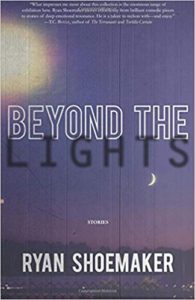 Ryan Shoemaker, Beyond the Lights. No Record Press.
Ryan Shoemaker, Beyond the Lights. No Record Press.
A stay-at-home dad documents his sex life on a Fitbit. Two teenage boys fall under the dangerous spell of a charismatic friend who enlists them to help find a buried treasure. A recent college graduate pads his law school application by teaching in an inner-city high school. These stories from Ryan Shoemaker’s first collection pass through landscapes of loneliness, stagnation, and bad good intentions. His characters often confront the disparity between illusion and reality—some clinging tenaciously to illusion, while others relinquish illusion to begin a journey to see the world, and themselves, through more compassionate eyes.
Ryan Shoemaker was raised in Auburn, Washington. His work appears in Silk Road Review, Santa Monica Review, Grist: A Journal for Writers, Monkeybicycle, and many others. Ryan holds two degrees from Brigham Young University (BA in English, 2001; MA in Fiction Writing, 2006). He has taught at Brigham Young University, Brigham Young University—Hawai’i, and the University of Southern California, where he has been a Merit Fellow in the Literature and Creative Writing doctoral program. Ryan lives in Burbank, California.
Short Fiction
(You can follow the links to read the full stories, with the exception of “All Light and Darkness”.)
Alison Maeser Brimley. “Thin Walls“. Western Humanities Review. 72.1, Spring 2018.
Excerpt: “A wall, thin and getting thinner with each pump, bracing under the weight of blood, bracing all its tissues till it gives up. The wall contorts itself to make room for the flow, bulges and twists into a bulb, two then ten then twenty millimeters across, hanging like a poison berry off a vine of artery. A berry growing fat with blood, waiting to stain the brain with juices that will drown it from the center out, a berry aching to burst. Foolish blood. It pumps because that’s the only thing it knows to do. But tonight the little fruit is overfull and breaks itself. Blood runs over brain, runs until it reaches skull.”
Alison Maeser Brimley won the 2017 Mountain West Writers Contest for this story. She has also won the 2018 Sunstone Fiction Contest, and received the 2017 AML Short Fiction Award for her story, “The Pew,” published in Dialogue, Fall 2017. Alison recently received her MFA in Creative Writing from BYU.
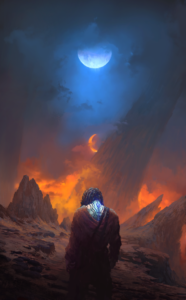
Amy Henrie Gillett, “All Light and Darkness.” L. Ron Hubbard’s Writers of the Future, Volume 34.
A nanotech-enhanced fugitive hiding from pursuit among refugees is drawn to a young woman with a unique genetic heritage, but when she attracts trouble, he must choose: her life or his humanity.
Amy Henrie Gillett lives in Texas with her husband and three kids. She was raised by a book-loving father and a word-loving mother, and she received her first personal rejection at nine years old thanks to a loving grandmother. All three ignited her lifelong need to write and her dream to publish. Amy received her BA in sociocultural anthropology and Middle East studies at BYU-Provo with an eye toward international development. Currently, she employs those studies in her writing. This, her first published story, won second place in the Writers of the Future Contest, 34:2.
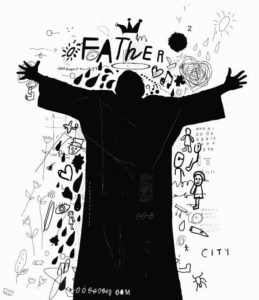 Ryan McIlvain, “Tower“. Sunstone. Fall 2018.
Ryan McIlvain, “Tower“. Sunstone. Fall 2018.
Excerpt: “Dad came home that afternoon from a last-minute grocery run, honking the horn from the driveway. I’d just turned thirteen, or maybe fourteen—springtime in any case, the air cool outside, greening.”
Ryan McIlvain‘s debut novel, Elders, was longlisted for the Center for Fiction’s First Novel Prize in 2013. His other work has appeared in print and online in The Paris Review, The Rumpus, Tin House, Post Road,The Believer, The Los Angeles Review of Books, and other venues, and has received honorable mention in The Best American Short Stories and The Best American Nonrequired Reading. McIlvain’s second novel, The Radicals, was published in 2018. A former recipient of the Stegner Fellowship at Stanford, he now lives with his family in Florida, where he is an assistant professor of English at the University of Tampa.
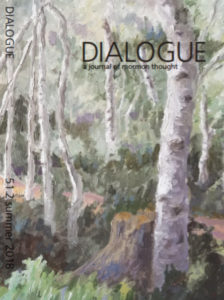 Ryan Shoemaker. “Light Departure”. Dialogue, Summer 2018.
Ryan Shoemaker. “Light Departure”. Dialogue, Summer 2018.
Inspired by his LDS mission experience in Italy. An excerpt: “The train lurched from the station and picked up speed, Ravenna receding into the green and gold countryside. I stared down at the cement ties of the adjoining track ticking hypnotically past. The train cut through a vast, rolling wheat field. I squinted. The wheat was a blinding, silvery white, shimmering and rippling in the breeze. For a moment, I experienced a dull guilt that radiated from my guts and washed up over my chest and shoulders. But when I touched the suitcase under my seat, the feeling subsided. Soon, I thought, one life would end and a new one—my life after the mission—would begin.”
This is the second time Shoemaker has been a finalist for an AML Short Fiction award.

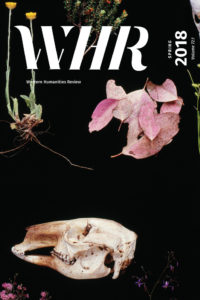
Congratulations everybody!